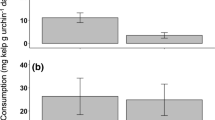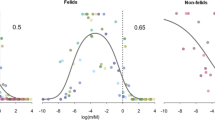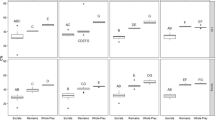Abstract
The General Stress Paradigm (GSP) predicts that prey body compositions should shift under chronic predation as prey increase body carbon and decrease body nitrogen content through dietary changes, heightened metabolism, reduced dietary efficiency, and the breakdown of nitrogen rich tissues to make labile carbohydrates available. In our study, we explored how the elemental and macronutrient content along with the morphology of three abundant Ozark glade grasshopper species differed between glades with and without predatory collared lizard (Crotaphytus collaris) populations. Our results indicated that lichen grasshoppers (Trimerotropis saxatilis) increased body C:N ratios in response to predators. Scudder’s short-wing grasshoppers (Melanoplus scudderi) increased both body %C and %protein content, while the handsome grasshoppers (Syrbula admirabilis) did not significantly respond to the presence of collared lizards. None of the three grasshopper species showed morphological responses to predation. We also found that elemental and macronutrient content of grasshoppers was not always significantly correlated and was not associated with the same environmental factors, indicating a need to incorporate both perspectives in future research and utilize more accurate macromolecular assays. Overall, we found support for some aspects of the GSP in field-active animals and add to the growing body of evidence that predator-induced changes in prey body composition are more complex than predicted by the original GSP.



Similar content being viewed by others
Availability of data and materials
The datasets used and/or analyzed during the current study are available from the corresponding author on reasonable request.
References
Bestion E, Cucherousset J, Teyssier A, Cote J (2015) Non-consumptive effects of a top-predator decrease the strength of the trophic cascade in a four-level terrestrial food web. Oikos 124:1597–1602. https://doi.org/10.1111/oik.02196
Bland RG (2003) The orthoptera of Michigan. Michigan State University Extension, East Lansing
Blatchley WS (1920) Orthoptera of Northeastern America. The Nature Publishing Company, Indianapolis
Blair WF, Blair A (1941) Food habits of the collared lizard in northeastern Oklahoma. Am Midl Nat 26:230–232
Brewster CL, Beaupre SJ, Wilson JD (2018) Habitat loss and local extinction: linking population declines of eastern collared lizards (Crotaphytus collaris) to habitat degradation of Ozark glades. J Herpetol 52(3):352–360. https://doi.org/10.1670/18-002
Brisson JA, Strasburg JL, Templeton AR (2003) Impact of fire management on the ecology of collared lizard (Crotaphytus collaris) populations living on the Ozark Plateau. Anim Conserv 6:247–254
Brust M, Jim T, Chris R, Lonnie B, Robert Q, Amanda J, Ford R (2020) Grasshoppers of the Western U.S., Edition 4.1. USDA APHIS Identification Technology Program (ITP). Fort Collins, CO. https://idtools.org/id/grasshoppers
Capinera JL, Ralph DS, Walker TJ (2004) Field guide to grasshoppers, katydids, and crickets of the United States. Cornell University Press, Ithaca
Costello DM, Michel MJ (2013) Predator-induced defenses in tadpoles confound body stoichiometry predictions of the general stress paradigm. Ecology 94(10):2229–2236. https://doi.org/10.1890/12-2251.1
Dalton CM, Flecker AS (2014) Metabolic stoichiometry and the ecology of fear in Trinidadian guppies: consequences for life histories and stream ecosystems. Oecologia 176:691–701. https://doi.org/10.1007/s00442-014-3084-6
Dannet BJ, Joern A (2003) Resource-mediated impact of spider predation risk on performance in the grasshopper Ageneotettix deorum (Orthoptera: Acrididae). Oecologia 137(3):352–359. https://doi.org/10.1007/s00442-003-1362-9
Elser JJ, Dobberfuhl DR, MacKay NA, Schampel JH (1996) Organism size, life history and N: P stoichiometry. Bioscience 46(9):674–685. https://doi.org/10.2307/1312897
Estes JA, Terborgh J, Brashares JS, Power ME, Berger J, Bond WJ, Carpenter SR, Essington TE, Holt RD, Jackson JBC, Marquis RJ, Oksanen L, Oksanen T, Paine RT, Pikitch EK, Ripple WJ, Sandin SA, Scheffer M, Schoener TW, Shurin JB, Sinclair ARE, Soulé ME, Virtanen R, Wardle DA (2011) Trophic downgrading of planet earth. Science 333(6040):301–306. https://doi.org/10.1126/science.1205106
Frank DA (2008) Evidence for top predator control of a grazing ecosystem. Oikos 117(11):1718–1724. https://doi.org/10.1111/j.1600-0706.2008.16846.x
Fraser LH, Harrower WL, Garris HW, Davidson S, Hebert PDN, Howie R, Moody A, Polster D, Schmitz OJ, Sinclair ARE, Starzomski BM, Sullivan TP, Turkington R, Wilson D (2015) A call for applying trophic structure in ecological restoration. Restor Ecol 23(5):503–507. https://doi.org/10.1111/rec.12225
Fukami T, Wardle DA, Bellingham PJ, Mulder CPH, Towns DR, Yeates GW, Bonner KI, Durrett MS, Grant-Hoffman MN, Williamson WM (2006) Above- and below-ground impacts of introduced predators in seabird-dominated island ecosystems. Ecol Lett 9(12):1299–1307. https://doi.org/10.1111/j.1461-0248.2006.00983.x
Gerber AS, Templeton AR (1996) Population sizes and within-deme movement of Trimerotropsis saxatilis (Acrididae), a grasshopper with a fragmented distribution. Oecologica 105:343–350
Grimsley AA (2012) A reexamination of the eastern collared lizard (Crotaphytus collaris collaris) in Arkansas. Masters thesis, Department of Biology, University of Arkansas, Fayettville, Arkansas, USA.
Guariento RD, Luttbeg B, Silva L, Adriano C (2018) Prey adaptive behavior under predation risk modify stoichiometry predictions of predator-induced stress paradigms. Funct Ecol 32:1631–1643. https://doi.org/10.1111/1365-2435.13089
Hawlena D, Schmitz OJ (2010a) Physiological stress as a fundamental mechanism linking predation to ecosystem functioning. Am Nat 176(5):537–556. https://doi.org/10.1086/656495
Hawlena D, Schmitz OJ (2010b) Herbivore physiological response to predation risk and implications for ecosystem nutrient dynamics. PNAS 107(35):15503–15507. https://doi.org/10.1073/pnas.1009300107
Hawlena D, Hughes KM, Schmitz OJ (2011) Trophic trait plasticity in response to changes in resource availability and predation risk. Funct Ecol 25:1223–1231. https://doi.org/10.1111/j.1365-2435.2011.01891.x
Hawlena D, Strickland MS, Bradford MA, Schmitz OJ (2012) Fear of predation slows plant litter decomposition. Science 336:1434–1439. https://doi.org/10.1126/science.1220097
Hutchinson D (2003) Testing the central/peripheral model: analyses of microsatellite variability in the eastern collared lizard (Crotaphytus collaris collaris). Am Midl Nat 149:148–162
Janssens L, Stoks R (2013) Predation risk causes oxidative damage in prey. Biol Lett 9:20130350. https://doi.org/10.1098/rsbl.2013.0350
Janssens L, Van DM, Stoks R (2015) Warming reinforces non-consumptive predator effects on prey growth, physiology, and body stoichiometry. Ecology 6(12):3270–3280. https://doi.org/10.1890/15-0030.1
Kirschman LJ, Haslett S, Fritz KA, Whiles MR, Warne RW (2016) Influence of physiological stress on nutrient stoichiometry in larval amphibians. Physiol Biochem Zool 89(4):313–321. https://doi.org/10.1086/687047
Length RV (2016) Least-Squares Means: the R Package lsmeans. J StatSoftw 69(1):1–33
McAllister CA (1985) Food habits and feeding behavior of Crotaphytus collaris collaris (Iguanidae) from Arkansas and Missouri. Southwest Nat 30(4):597–600. https://doi.org/10.2307/3671055
Miller JRB, Ament JM, Schmitz OJ (2014) Fear on the move: predator hunting mode predicts variation in prey mortality and plasticity in prey spatial response. J Anim Ecol 83:214–222. https://doi.org/10.1111/1365-2656.12111
Östman Ö, Griffin NW, Strasburg JL, Brisson JA, Templeton AR, Knight TM, Chase JM (2007) Habitat area affects arthropod communities directly and indirectly through top predators. Ecography 30(3):359–366. https://doi.org/10.1111/j.2007.0906-7590.05123.x
Pfadt R (1994) Field Guide to Common Western Grasshoppers. Wyoming Agricultural Experimental Station
Pinheiro J, Bates D, DebRoy S, Sarkar D, R Core Team (2020) nlme: linear and nonlinear mixed effects models. R package version 3.1-151, https://CRAN.R-project.org/package=nlme. Accessed 2021
Preisser EL, Bolnick DI (2008) The many faces of fear: comparing the pathways and impacts of nonconsumptive predator effects on prey populations. PLoS One 3(6):e2465. https://doi.org/10.1371/journal.pone.0002465
Preisser EL, Orrock JL, Schmitz OJ (2007) Predator hunting mode and habitat domain alter nonconsumptive effects in predator-prey interactions. Ecology 88(11):2744–2751. https://doi.org/10.1890/07-0260.1
R Core Team (2020) R: a language and environment for statistical computing. Vienna, Austria: R Foundation for Statistical Computing. Retrieved from https://www.R-project.org/. Accessed 2021
Rabus M, Söllradl T, Clausen-Schaumann H, Laforsch C (2013) Uncovering ultrastructural defences in daphnia magna–An Interdisciplinary Approach to Assess the Predator-Induced Fortification of the Carapace. PLoS ONE 8(6):e67856. https://doi.org/10.1371/journal.pone.0067856
Raubenheimer D, Simpson SJ (2003) Nutrient balancing in grasshoppers: behavioural and physiological correlates of dietary breadth. J Exp Biol 206:1669–1681. https://doi.org/10.1242/jeb.00336
Redinger JM, Gifford ME (2022) The effect of an insectivorous lizard predator (Crotaphytus collaris) on Ozark glade orthopteran assemblages. Am Midl Nat 187(2):210–224. https://doi.org/10.1674/0003-0031-187.2.210
Relyea R (2001) The relationship between predation risk and antipredator responses in larval anurans. Ecology 82(2):541–554. https://doi.org/10.2307/2679878
Rinehart S, Hawlena D (2020) The effects of predation risk on prey stoichiometry: a meta-analysis. Ecology. https://doi.org/10.1002/ecy.3037
Ripple WJ, Beschta RL (2004) Wolves, elk, willows, and trophic cascades in the upper Gallatin Range of Southwestern Montana, USA. Forest Ecol Manag 200:161–181. https://doi.org/10.1016/j.foreco.2004.06.017
Rutaro K, Malinga GM, Lehtovaara VJ, Opoke R, Valtonen A, Kwetegyeka J, Nyeko P, Roininen H (2018) The fatty acid composition of edible grasshopper Ruspolia differens (Serville) (Orthoptera: Tettigoniidae) feeding on diversifying diets of host plants. Entomol Res 48:490–498. https://doi.org/10.1111/1748-5967.12322
Ryberg WA (2009) Predation, community assembly, and the scaling of prey diversity in Ozark glade metacommunities. PhD dissertation, Department of Biology, Washington University, St. Louis, Missouri, USA
Ryberg WA, Chase JM (2007) Predator-dependent species-area relationships. Am Nat 170(4):636–642. https://doi.org/10.1086/521228
Schmitz OJ (2003) Top predator control of plant biodiversity and productivity in an old-field ecosystem. Ecol Lett 6:156–163. https://doi.org/10.1046/j.1461-0248.2003.00412.x
Schmitz OJ (2006) Predators have large effects on ecosystem properties by changing plant diversity, not plant biomass. Ecology 87(6):1432–1437
Schmitz OJ, Beckerman AP, O’Brien KM (1997) Behaviorally mediated trophic cascades: effects of predation risk on food web interactions. Ecology 78(5):1388–1399
Schmitz OJ, Hambäck PA, Beckerman AP (2000) Trophic cascades in terrestrial systems: a review of the effects of carnivore removals on plants. Am Nat 155(2):141–153. https://doi.org/10.1086/303311
Schmitz OJ, Hawlena D, Trussell GC (2010) Predator control of ecosystem nutrient dynamics. Ecol Lett 13(10):1199–1209. https://doi.org/10.1111/j.1461-0248.2010.01511.x
Sexton OJ, Andrews RM, Bramble JE (1992) Size and growth rate characteristics of a peripheral population of Crotaphytus collaris (Sauria: Crotaphytidae). Copeia 1992(4):968–980. https://doi.org/10.2307/1446626
Sperfeld E, Halvorson HM, Mallishev M, Clissold FJ, Wagner ND (2016) Woodstoich III: integrating tools of nutritional geometry and ecological stoichiometry to advance nutrient budgeting and the prediction of consumer-driven nutrient recycling. Oikos 124(7):001–015. https://doi.org/10.1111/oik.03529
Sterner RW, Elser JJ (2002) Ecological stoichiometry: the biology of elements from molecules to the biosphere. Princeton University Press, Princeton
Strickland MS, Hawlena D, Reese A, Bradford MA, Schmitz OJ (2013) Trophic cascade alters ecosystem carbon exchange. PNAS 110(27):11035–11038
Templeton AR, Robertson RJ, Brisson J, Strasburg J (2001) Disrupting evolutionary processes: the effect of habitat fragmentation on collared lizards in the Missouri Ozarks. PNAS 98(10):5426–5432. https://doi.org/10.1073/pnas.091093098
Terborgh J, Lopez L, Nuńez P, Rao M, Orihuela G, Riveros M, Ascanio R, Adler GH, Thomas D, Balbas L, Hubert P, Riveros M, Ascanio R, Adler GH (2002) Ecological meltdown in predator-free forest fragments. Science 294(5548):1923–1926. https://doi.org/10.1126/science.1064397
Thaler JS, McArt SH, Kaplan I (2012) Compensatory mechanisms for ameliorating the fundamental trade-off between predator avoidance and foraging. PNAS 109(30):12075–12080. https://doi.org/10.1073/pnas.1208070109
Trauth SE, Robison HW, Plummer M (2004) The Amphibians and Reptiles of Arkansas. The University of Arkansas Press.
Van Buskirk J, Mccollum SA (2000) Influence of tail shape on tadpole swimming performance. J Exp Biol 203(14):2149–2158. https://doi.org/10.1242/jeb.203.14.2149
Werner EE, Peacor SD (2003) A review of trait-mediated indirect interactions in ecological communities. Ecology 84(5):1083–1100. https://doi.org/10.1890/0012
Whitman DW, Vincent S (2008) Large size as an antipredator defense in an insect. J Orthoptera Res 17(2):353–371. https://doi.org/10.1665/1082-6467-17.2.353
Wilder SM, Eubanks MD (2010) Might nitrogen limitation promote omnivory among carnivorous arthropods? Comment Ecol 91(10):3114–3117. https://doi.org/10.1890/09-2080.1
Wilder SM, Jeyasingh PD (2016) Merging elemental and macromolecule approaches for a comprehensive study of energy and nutrient flows. J Animal Ecol 85(6):1427–1430. https://doi.org/10.1111/1365-2656.12573
Wilder SM, Norris M, Lee RW, Raubenheimer D, Simpson SJ (2013) Arthropod food webs become increasingly lipid-limited at higher trophic levels. Ecol Lett 16:895–902
Wineland SM, Kistner EJ, Joern A (2015) Non-consumptive interactions between grasshoppers (Orthoptera: Acrididae) and wolf spiders (Lycosidae) produce trophic cascades in an old-field Ecosystem. J Orthoptera Res 24(1):41–46. https://doi.org/10.1665/034.024.0101
Zaguri M, Kandel S, Rinehart SA, Torsekar VR, Hawlena D (2021) Protein quantification in cological studies: a literature review and empirical comparisons of standard methodologies. Methods in Ecol and Evol 12:1240–1251. https://doi.org/10.1111/2041-210X.13601
Zhang C, Jansen M, De Meester L, Stoks R (2016) Energy storage and fecundity explain deviations from ecological stoichiometry predictions under global warming and size-selective predation. J Animal Ecol 85(6):1431–1441. https://doi.org/10.1111/1365-2656.12531
Acknowledgements
We thank the Sylamore Ranger District of the Ozark-St. Francis National Forest Service for access to the study sites, and C.L. Brewster for assisting with access to study sites.
Funding
This project was funded by grants to JMR from the Chicago Herpetology Society, University of Central Arkansas Department of Biology, Southwestern Energy, American Society of Ichthyology and Herpetology, and Sigma Xi.
Author information
Authors and Affiliations
Contributions
JMR and MEG conceived and designed the experiments. JMR performed the experiments. JMR and MEG analyzed the data. HMH offered feedback on experimental design and analysis. JMR, MEG, and HMH wrote the manuscript.
Corresponding author
Ethics declarations
Conflict of interest
No competing interests declared.
Ethical approval
All recent work was approved by the University of Central Arkansas Animal Care and Use Committee (IACUC #20-002).
Additional information
Communicated by Stefan Scheu.
This paper represents the first test of the General Stress Paradigm in field active animals, and in multiple species simultaneously.
Supplementary Information
Below is the link to the electronic supplementary material.
Rights and permissions
About this article
Cite this article
Redinger, J.M., Halvorson, H.M. & Gifford, M.E. Variable stoichiometric and macronutrient responses to lizard predation in Ozark glade grasshopper communities. Oecologia 199, 757–768 (2022). https://doi.org/10.1007/s00442-022-05185-w
Received:
Accepted:
Published:
Issue Date:
DOI: https://doi.org/10.1007/s00442-022-05185-w




